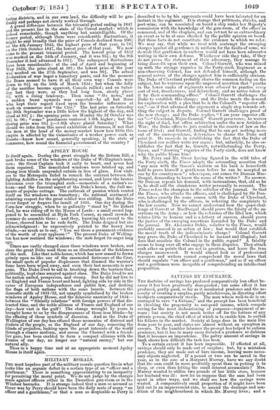MILITARY MORALS.
THE most hopeless part of the military morals question lies in what looks like an organic defect in a certain type of an "officer and a gentleman." There is-something approximating to an incapacity for perceiving the moral point We do not judge by the charges made against officers either in the Dauntless gun-room or in the Windsor barracks. It is strange indeed that a man so accused as Greer was by Perry should have been the daily mate of many "an officer and a gentleman," or that a man so despicable as Perry is described to be by his opponents could have been tolerated for an instant in the regiment. It is strange that petticoats, shrieks, and port-wine, can be associated on board a ship under her Majesty's commission with the knowledge of the gun-room, of the officer in command, and of the chaplain, and can yet not be so extraordinary an event as to be at once checked by the public opinion on board. But these facts do not constitute the evidence to which we refer. We may say, that while we treat with contempt the sweeping charges against all gentlemen in uniform for the faults of some, we do wish that gentlemen in uniform would not have been advocates writing in their own defence. Whichever side they take, if they do not prove the statement of their adversary, they manage to bring discredit upon their own. Colonel Garrett, who was mixed up with the strange vagaries in the Forty-sixth Regiment as a non-observing Colonel, has not defended himself, although the general nature of the charges against him is sufficiently obvious. The Duke of Cleveland probably shares the common feeling on the subject, but he ventures upon the unproved assertion that "youths in the lower ranks of regiments were allowed to practise erery sort of riot, drunkenness, and debauchery, and no notice taken of it by their commanding-officer." Colonel Garrett challenges the Duke to establish this charge; and the Duke meets the demand for explanation with a plea that he is the Colonel's "superior offi- cer,"—as if that advanced the argument a single step towards set- tling the subject in dispute. Colonel Garrett challenges proof of the new charge; and the Duke replies, "I am your superior offi- cer "—" Cleveland, Major-General." Garrett perseveres; he waives the right of duel, but offers arbitration under the new Articles of War; the Duke offers to join combat in the courts of law on the issue of libel ; and Garrett, finding that he can get nothing more out of the correspondence, determines to shame the Duke and print it. Ile succeeds in establishing the fact that the Duke of Cleveland can neither write nor argue ; but, unluckily, he also es- tablishes the fact that he, Garrett, notwithstanding the Perry, Greer, and "drawing" vagaries of the Forty-sixth, does not know why the public blame him !
Mr. Perry and Mr. Greer having figured in the wild tales of the Forty-sixth, the Times adopts the astounding assertion that "any man with the Queen's uniform on his back is henceforth held to prove himself a gentleman before he can be accepted as one by his countrymen "; whereupon, out comes Sir Duncan Mac- Dougal, demanding to know the name of the writer ? No answer. Sir Duncan repeats his demand, with insinuations, that, old as he is, he shall call the slanderous writer personally to account. The Times refers the champion to the solicitor of the journal. So that the Times, who attacks the officers, and is challenged by Sir Dun- can, takes exactly the same course with the Duke of Cleveland, who is challenged by the officers, in referring the complaints to the law courts. Now we cannot understand how the quasi-chal- lenge of Garrett or MacDougal should prove the falsity of the as- sertions on the Army ; or how the reference of the libel law, which relates little to honour and is a lottery of success, should prove the justice of the sweeping assertions hazarded by the Duke and the journal. Mr. Alexander Dobie, solicitor to the Times, would probably succeed in an action at law ; but would that establish the moral truth of the indiscriminate charge ? Colonel Garrett may prove the Duke of Cleveland to be inexact and illogical; but does that assoilzie the Colonel in the public regard ? A fatality seems to hang over all who engage in these disputes. They attack each other on points that are not in question, and leave the true charges unanswered. It would almost look as if professional reasoners and writers cannot comprehend the moral laws that should regulate "an officer and a gentleman," and as if an officer and a gentleman were incapable of comprehending an intellectual proposition.


































 Previous page
Previous page